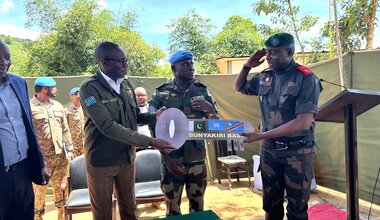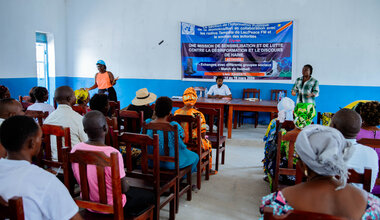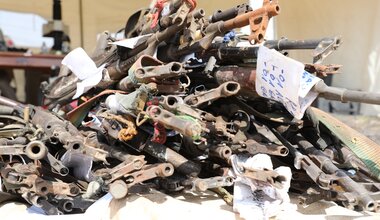DDR/RR, political, security and development imperatives
Bukavu, 22 April 2015 —MONUSCO/DDRRR explained the goals and objectives of the Disarmament, Demobilization, Repatriation, Reintegration and Resettlement (DDRRR) process as well as related activities to the students of the University Simon Kimbangu on Wednesday 22 April 2015 in a conference debate that brought together fifty students from the different fields of this academic institution.
In a pedagogic move, Anatole Clément Banem of the DDRRR/MONUSCO section took the students through the Disarmament, Demobilization and Reintegration process (DDR) for local armed groups as well as through the Disarmament, Demobilization, Repatriation, Reintegration and Resettlement (DDRRR) process for foreign armed groups). Anatole Banem highlighted “DDR took shape in a conflict-affected environment” where “most conflicts are caused by bad governance.”
For over two decades, DRC’s history were overshadowed by protracted conflicts whose effects are still visible today, Anatole Banem said when the conflict broke out, the different parties, government and rebels had to work together to stabilize the country; so, a momentum was set up for negotiations to secure a cease-fire and peace agreement. All these efforts led to the DDR, a process aimed at disarming members of irregular armed groups to reintegrate them into the society in a democratic move. Two scenarios were envisaged, the candidates to the DDR process either opted for joining the army or police force or reintegrating the civilian life.
MONUSCO DDRRR process is now busy disarming, demobilizing and repatriating the foreign combatants, namely the Democratic Forces for the Liberation of Rwanda (FDLR), the “Forces Nationales de Libération du Burundi/National Force for the Liberation of Burundi” (FNL), the coalition Allied Democratic Forces, the National Army for the Liberation of Uganda (ADF-NALU) and the Lord’s Resistance Army (LRA) opposed to the ruling power in Uganda.
Statistics suggest that for the year 2014 alone, 223 foreign ex-combatants with 465 dependents were repatriated to their respective countries with the help of the DDRRR process in the South Kivu province. Furthermore, said Anatole Banem, MONUSCO has been funding projects for the reduction of Community Violence (RVC) in the South Kivu province aimed at facilitating the reintegration of the demobilized elements of the armed groups.
A similar project carried out in Shabunda was inaugurated on Friday 17 April 2015 to the tune of $73,937; the center built in the town of Shabunda will be used to teach young people how to make bricks, to build houses, to do carpentry, dress-making. Altogether 389 people including 159 women received the training; Anatole Banem concluded that the action carried out by the DDRRR does meet the political, security and development imperatives.
The interactions with the students of the University Simon Kimbangu like any other training organized across the universities in Bukavu are aimed at making MONUSCO’s mandate and activities known to the students.
Alain S. Likota
 ONU
ONU Nations Unies Maintien de la paix
Nations Unies Maintien de la paix


